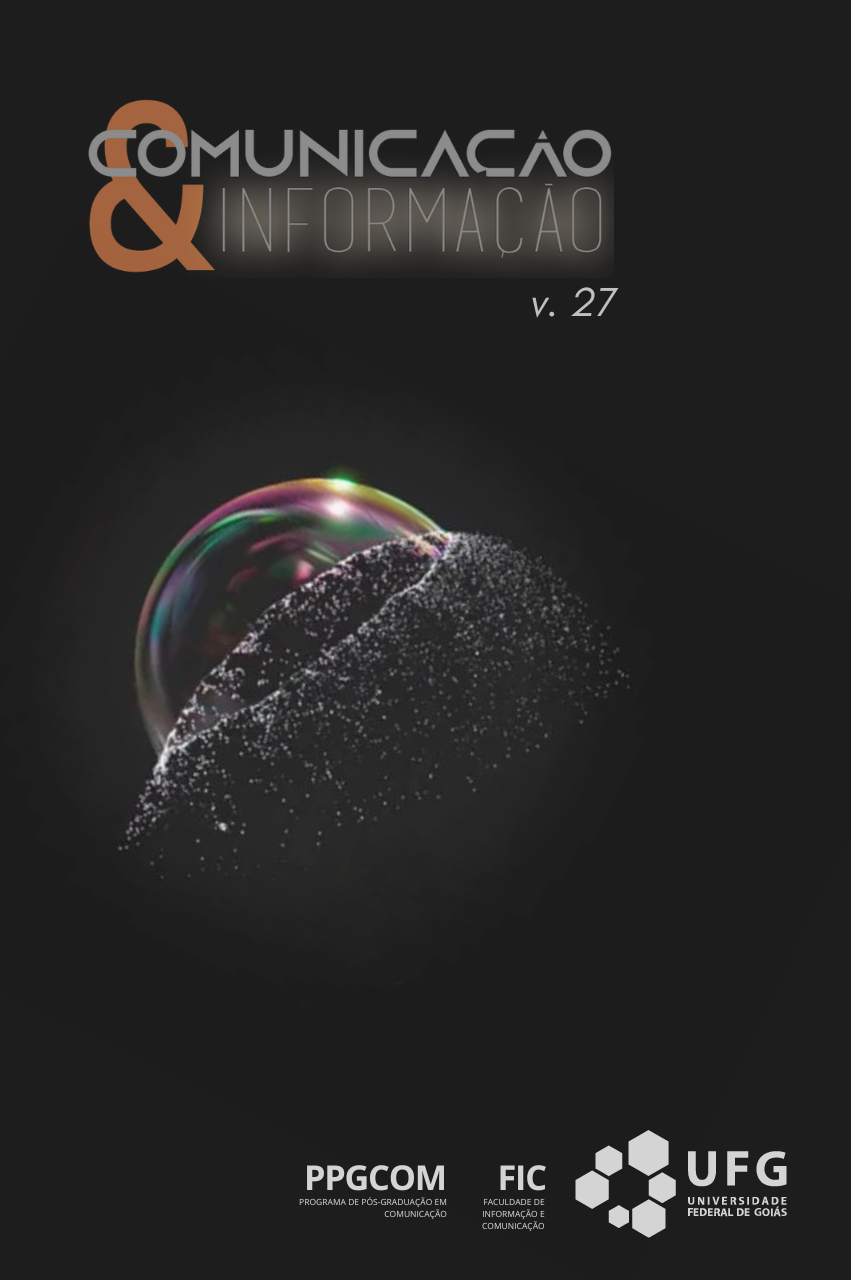Disinformation in politics
An Analysis of Content About the Coronavirus Posted on President Jair Bolsonaro's Twitter Profile Between January and May 2020
DOI:
https://doi.org/10.5216/ci.v27.78987Keywords:
Twitter, Bolsonaro, Coronavírus, DesinformaçãoAbstract
Communication and its systems are an expression of the social, political, and economic processes of societies. In light of this, this article analyzes the occurrence of disinformation on President Jair Bolsonaro's Twitter (X) profile based on a collection from January to May 2020, using Actor-Network Theory as a reference. The conclusion was reached, after analyzing more than 40 posts, that in addition to information not validated through sources and diverse opinions, firehosing is used with the aim of mobilizing public opinion around the values shared by the president and his followers, in a phenomenon known as echo chambers. Even though four years have passed since the collection, it must be considered that the political tension, which led to the disinformation epidemic following Donald Trump's presidential campaign in 2018, remains equally present in Brazil and in the global context (so much so that Trump is a pre-candidate for the position in 2024).
Downloads
References
AOS FATOS. Em 458 dias como presidente, Bolsonaro deu 815 declarações falsas ou distorcidas. 03 abr. 2020. Disponível em: https://aosfatos.org/todas-as-declara%C3%A7%C3%B5es-de-bolsonaro/. Acesso em: 06/04/2020.
BENITES, Afonso. A máquina de ‘fake news’ nos grupos a favor de Bolsonaro no WhatsApp. In: El País. 28 set. 2018. Disponível em: https://brasil.elpais.com/brasil/2018/09/26/politica/1537997311_859341.html. Acesso em: 04 abr. 2020.
CASTELLS, Manuel. A sociedade em rede. São Paulo: Paz e Terra,1999.
CORDEIRO, D. F.; LEAL, M. R.; VIEIRA, L. M.; SILVA, N. R. Cartografando comentários e sentimentos no perfil de Jair Bolsonaro no Instagram acerca da Covid-19. Revista Galáxia, v. 47, e56929, 2022. https://doi.org/10.1590/1982-2553202256929.
CORRÊA, Alessandra. Coronavírus: por que a população negra é desproporcionalmente afetada nos EUA?. BBC Brasil. Disponível em: https://www.bbc.com/portuguese/internacional-52267566. Acesso em: 14 jul. 2020.
COVAS, Bruno. Negros têm 37,5% mais chance de morrer de Covid-19 do que brancos em SP, diz prefeito. In: Buzzfeed Brasil. 2020. Disponível em: https://www.buzzfeed.com/br/tatianafarah/negros-tem-375-mais-chance-de-morrer-de-covid-19-do-que?origin=shp. Acesso 14 jun. 2020.
DEOLINDO, J. da S.; CURVELLO, M. J. V. Jornalismo local e condições de cobertura da pandemia de Covid-19: um estudo de caso no interior fluminense. Comunicação & Informação, Goiânia, Goiás, v. 26, p. 35–58, 2023. DOI: 10.5216/ci.v26.71964. Disponível em: https://revistas.ufg.br/ci/article/view/71964. Acesso em: 9 abr. 2024.
GARRET, Kelly R. Echo chambers online?: Politically motivated selective exposure among Internet news users. In: Journal of Computer-Mediated Communication. 2009. Disponível em: https://academic.oup.com/jcmc/article/14/2/265/4582957. Acesso em: 06 abr. 2020.
GIACOMOZZI, Andréia Isabel; VITALI, Marieli; PRESOTTO, Gabrielle; VIDAL, Gabriela; GOMES, Marcela. Constructing emotional meanings about Jair Bolsonaro in Brazil during the Covid 19 pandemic on twitter. In: Discover Global Society. 2024. Disponível em: https://link.springer.com/article/10.1007/s44282-024-00066-4. Acesso em: 13 ago. 2024.
LATOUR, Bruno. Reagregando o social: uma introdução à Teoria Ator-rede. Salvador: Edufba, 2012.
LEVY, Pierre. O que é o virtual?. São Paulo: 34, 1997.
MBEMBE, Achille. Necropolítica. 3. ed., São Paulo: n-1 edições, 2018.
MBEMBE, Achille. Pandemia democratizou poder de matar, diz autor da teoria da 'necropolítica'. In: Folha de São Paulo. Disponível em: https://webcache.googleusercontent.com/search?q=cache:OoZY9oIabBIJ:https://www1.folha.uol.com.br/mundo/2020/03/pandemia-democratizou-poder-de-matar-diz-autor-da-teoria-da-necropolitica.shtml+&cd=1&hl=pt-BR&ct=clnk&gl=br. Acesso em: 14 jul. 2020.
MINISTÉRIO DA SAÚDE. Laudo técnico. Disponível em: https://covid.saude.gov.br/. Acesso em: 12 jul. 2020.
OLIVEIRA, Dennis. A violência estrutural na América Latina na lógica do sistema da necropolítica e da colonialidade do poder. 2018. Disponível em: http://www.revistas.usp.br/extraprensa/article/view/145010/147020. Acesso em: 04 abr. 2020.
LASSWELL, Harold. Propaganda technique in the World War. Boston: MIT Press, 2009.
PAES, Amanda; BRASIL, Vanessa; MASSARANI, Luisa. Negacionismo científico. Un Análisis del Twitter de Jair Bolsonaro en marzo y noviembre de 2020. In: Razón y Palabra. 2020. Disponível em: https://ryp.cheersportwildcats.com/index.php/ryp/article/view/1929/1762. Acesso em: 13 ago. 2024.
PENTEADO, Cláudio Luís; GOYA, Denise; SANTOS, Patrícia; JARDIM, Luiza. 2022. Populismo, desinformação e Covid-19: comunicação de Jair Bolsonaro no Twitter. In: Media & Jornalismo, 22(40), 239-260. Disponível em: https://doi.org/10.14195/2183-5462_40_12. Acesso em: 13 ago. 2024.
RECUERO, Raquel. Redes sociais na internet. Porto Alegre: Sulina, 2014.
R7 PLANALDO. Trump exalta trabalho de Bolsonaro e diz que Estados Unidos o amam. 07 mar. 2020. Disponível em: https://noticias.r7.com/prisma/r7-planalto/trump-exalta-trabalho-de-bolsonaro-e-diz-que-estados-unidos-o-amam-08032020. Acesso em: 04 abr. 2020.
ROSSI, Clóvis. O que é jornalismo?. São Paulo: Brasiliense, 1980.
TWITTER. Nota sobre post deletado do usuário Jair Bolsonaro. Regras e políticas. 2020. Disponível em: https://help.twitter.com/pt/rules-and-policies. Acesso em: 04 abr. 2020.
UN NEWS. Coronavirus: UN health agency moves fast to tackle ‘infodemic’; Guterres warns against stigmatization. 04 fev. 2020. Disponível em: https://news.un.org/en/story/2020/02/1056672. Acesso em: 04 abr. 2020.
WARDLE, Claire. Misinformation Has Created a New World Disorder. In: Scientific American. 2019. Disponível em: https://www.scientificamerican.com/article/misinformation-has-created-a-new-world-disorder. Acesso em: 04 abr. 2020.
WENDT, Emerson. et al. Crimes Cibernéticos: Ameaças e procedimentos de investigação. Rio de Janeiro: Editora Brasport, 2016.
Downloads
Published
How to Cite
Issue
Section
License
Os autores dos trabalhos publicados na revista Comunicação e Informação retêm os direitos autorais sem restrições e concedem à revista o direito de primeira publicação, com o trabalho simultâneo licenciado sob a Licença Creative Commons Atribuição-NãoComercial que permite o compartilhamento do trabalho para fins não comerciais com reconhecimento da autoria e o privilégio de publicação primeiramente por esta revista. Caso o texto venha a ser publicado posteriormente em outro veículo, solicita-se aos autores informar que o mesmo foi originalmente publicado como artigo na revista Perspectiva, bem como citar as referências bibliográficas completas dessa publicação.
Os direitos autorais dos artigos pertencem aos autores e o conteúdo dos artigos assinados é de responsabilidade exclusiva dos autores.
A revista se reserva o direito de efetuar, nos originais, alterações de ordem normativa, ortográfica e gramatical, com o intuito de manter o padrão culto da língua, respeitando, porém, o estilo dos autores.
A revista também se reserva o direito de traduzir o artigo, no todo ou em parte, para o inglês ou para o português, dependendo do idioma em que o artigo tenha sido escrito originalmente.



